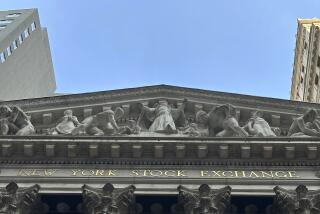Patient’s Death Halts New MS Drug
- Share via
The makers of a promising new drug for multiple sclerosis abruptly pulled it off the market Monday after one patient died of a rare central nervous system disorder.
Biogen Idec Inc. and Elan Corp. saw massive drops in their share prices and lost nearly $18 billion in market value combined.
The companies described the withdrawal of Tysabri as a “suspension” and said they would try to get the drug back on the market. “This is a pause we have taken to enable us to learn whether there are any other cryptic cases out there that we are not aware of,” said Dr. Burt Adelman, Biogen’s executive vice president for development.
The Food and Drug Administration, which consulted with the companies on the decision to withdraw Tysabri, said in a statement that it continued to believe that the drug “offers great hope to MS patients.”
The FDA gave Tysabri fast-track approval in November after the first year of clinical trial results showed that it was better than existing medicines in reducing the rate of relapse in multiple sclerosis patients. The FDA typically requires two years of data before it approves an MS drug; in that case, Tysabri probably wouldn’t have been available until the end of 2005.
Its withdrawal could be a black eye for the agency’s fast-track program, which is intended to speed breakthrough drugs but has been criticized in the past for rushing unsafe medicines to market.
Sidney Wolfe, director of drug safety for the advocacy group Public Citizen and a frequent FDA critic, said it wasn’t clear whether the fast-track process should be faulted in this case. “If the drug was on a slow track,” he said, “would these problems have turned up sooner?”
The FDA has been under increasing fire on other fronts lately. Congress, for example, has held hearings into the agency’s handling of other drugs, including Merck & Co.’s painkiller Vioxx -- which was taken off the market after the company discovered that people who took it were at increased risk of heart attack -- and Chiron Corp.’s British-made flu vaccine, which was found to be contaminated at its Liverpool factory.
For MS patients, who hadn’t seen a new drug for multiple sclerosis in more than a decade, Tysabri’s withdrawal was a disappointment. About 400,000 Americans have MS, a degenerative nerve disorder that over time can cause blurred vision, impaired speech and reduced muscle control. About half of all patients end up being permanently disabled.
Tysabri “gave people a lot of hope,” said John Richert of Georgetown University, an investigator in the drug’s trial.
Stephanie Tellin-Mednik, 48, a multiple sclerosis patient from Canoga Park who received her first dose of Tysabri two weeks ago, said that when she heard the news, “my heart sank. I felt like the rug had been pulled out from underneath me.”
Biogen and Elan said that they were in the process of wrapping up their two-year clinical study last month when they learned that a patient had developed progressive multifocal leukoencephalopathy, or PML, a condition that destroys the myelin sheath that protects nerve fibers. It is caused by a virus and found in people with suppressed immune systems, such as patients with AIDS or organ transplants.
The two companies said they notified the FDA on Feb. 18 that one patient had died of PML and that another patient was suspected of having it. The two patients were among about 500 in a clinical trial looking at how Tysabri worked with Avonex, Biogen Idec’s older MS treatment. They had received the drug combination for more than two years.
Tysabri acts on immune cells that are believed to cause inflammation of nerve cells in multiple sclerosis patients. Biogen said that about 5,000 patients in the U.S. had received the intravenous drug since it was approved in November. Other clinical trials to study the drug in patients with Crohn’s disease and rheumatoid arthritis also were suspended on Monday.
The companies said they were reviewing records of clinical trial patients for signs of PML and said they planned to meet with experts to figure out whether Tysabri was somehow making patients susceptible to the virus.
Richert said it could take several months to complete the companies’ probe. “There is a monumental amount of data to sort through,” he said.
The withdrawal was a blow to Biogen and Elan, which were counting on the medicine to drive their growth. Biogen built a $380-million factory near San Diego to produce the drug.
Geoffrey Porges, a biotechnology industry analyst with Sanford Bernstein in New York, had expected the companies to rack up $3 billion in worldwide Tysabri sales by the time the drug was fully ramped up in 2010. Now, he said, there is only a “negligible” chance the drug will reach full potential.
“Even in the wild world of biotech, this is extraordinary,” Porges said.
Shares of Cambridge, Mass.-based Biogen Idec plummeted to $38.69, down $28.59, or 43%, on the New York Stock Exchange. Also on the NYSE, shares of Ireland-based Elan fell $18.90, or 70%, to $8.
Times staff writer Jerry Hirsch contributed to this report.







